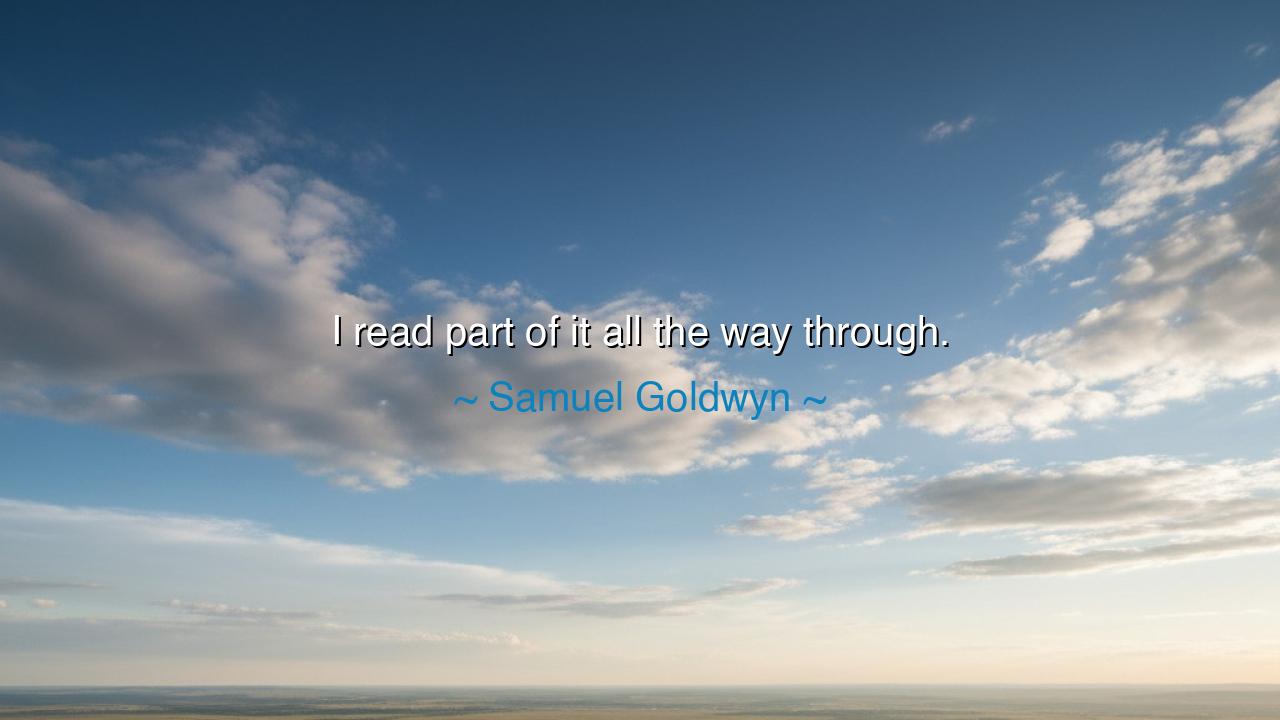
I read part of it all the way through.






In the grand halls of Hollywood’s golden age, where dreams were traded like gold and words carried the weight of spectacle, the legendary producer Samuel Goldwyn once declared, with the sincerity of a king and the confusion of a poet: “I read part of it all the way through.” To the casual ear, it is a jumble — a paradox, a tangle of thought. Yet within its contradiction lies a mirror to the human soul. For what Goldwyn spoke in jest or inadvertent humor reflects a universal truth: that men often believe they understand what they have only glimpsed, and that partial understanding can masquerade as wisdom. The phrase is both comic and profound, an accidental scripture of self-deception and human limitation.
Samuel Goldwyn, one of the founding titans of the film industry, was a man famed for his paradoxical wit — sayings so unintentional in their brilliance that they became known as “Goldwynisms.” In truth, this line arose not from malice or philosophy, but from his habit of speaking from the heart before consulting the mind. Yet, as so often happens with the words of fools and sages alike, meaning grew around the moment. His statement — “I read part of it all the way through” — captures the folly of human haste: the tendency to claim mastery without patience, to skim life as one skims a page, and yet to believe one has reached its depths.
There is a timeless echo of this folly in the story of Icarus, who, hearing only part of his father Daedalus’s warning, soared too near the sun. He understood enough to fly, but not enough to endure. Like Goldwyn’s confession, Icarus’s flight was born of confidence without comprehension — a tragic reading of life’s book “part of the way through.” Thus, from ancient myth to modern jest, the same lesson unfolds: partial understanding is the most dangerous form of ignorance, for it disguises itself as knowledge.
Goldwyn’s accidental wisdom also reveals something gentler — the human longing to understand even when we fall short. In every pursuit, whether of art, philosophy, or love, we begin with glimpses, fragments, and fleeting insights. We read “part of it,” and yet we convince ourselves that we have “read it through.” The heart craves completion even when the mind falters. And though the line is humorous, it reminds us that humility is the beginning of true learning. For the wise do not boast of what they half-know; they acknowledge what remains unread.
The ancients spoke of this humility often. Socrates, standing before the rulers of Athens, declared that his wisdom lay only in knowing that he knew nothing. In this confession — far more deliberate than Goldwyn’s — lay the same divine irony: that knowledge begins where certainty ends. The man who claims to have “read part of it all the way through” is every one of us, speaking from the pride of partial insight. We skim the pages of experience, rushing toward understanding, yet the margins of truth remain unread.
In the world of art and creation, Goldwyn’s words carry yet another shade of meaning — the spirit of imperfection that defines all human endeavor. The artist, the scholar, the dreamer — none ever finishes the book of their craft. Every masterpiece remains unfinished, every truth glimpsed only in part. And yet, as Goldwyn’s line suggests, there is beauty even in the attempt. To have read “part of it all the way through” is still to have ventured into the realm of creation, to have wrestled with meaning even if one could not contain it. Thus, his jest becomes a quiet celebration of effort over perfection, of sincerity over mastery.
Let this then be the lesson, O listener and seeker of understanding: read deeply, not hurriedly. Do not claim to have grasped the world when you have only touched its surface. Be patient with the vastness of things; let curiosity be your guide and humility your guard. For it is better to read one page in truth than a thousand in pretense.
And yet, do not be ashamed of your partial readings, your half-finished journeys. For all of life is such a book — one we cannot finish before the final page turns itself. So walk on, as Goldwyn spoke on — flawed, human, and striving. Laugh at your own contradictions, as he did, and in laughter find wisdom. For though we all “read part of it all the way through,” the secret is not in completion, but in continuing to read — with wonder, with humility, and with joy.






AAdministratorAdministrator
Welcome, honored guests. Please leave a comment, we will respond soon